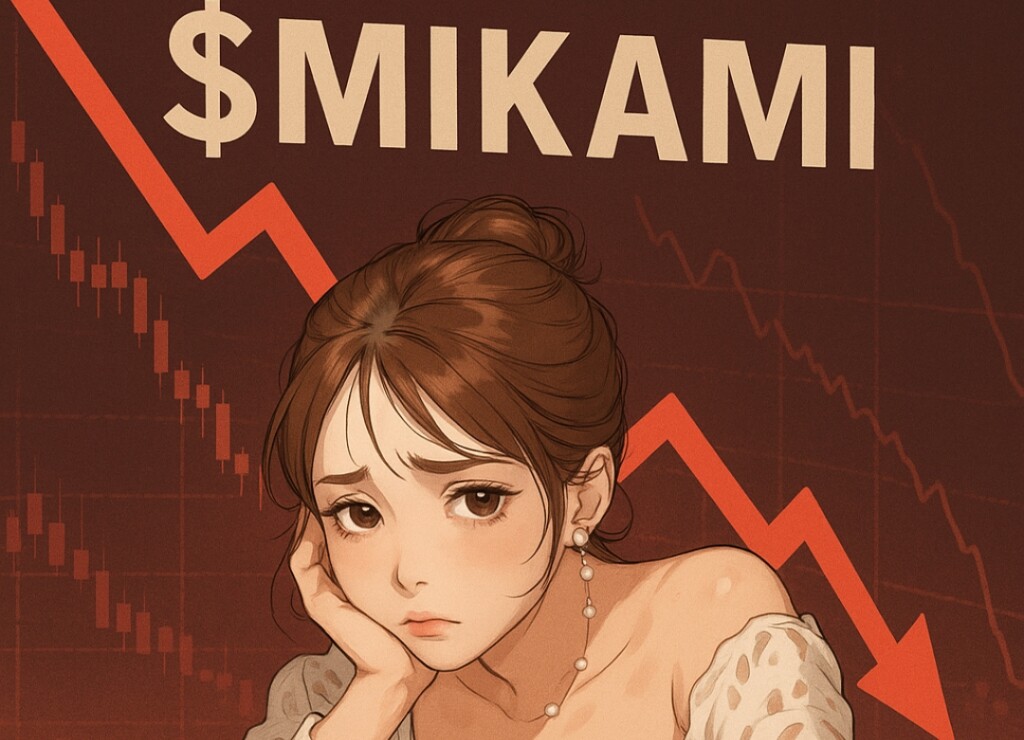Ignited by the very public collapse of FTX, the $MIKAMI token took on an entirely new light.
A Solana-based memecoin tied to Japanese actress Yua Mikami, $MIKAMI had always touted a tantalizing mixture of fan engagement, artificial intelligence, and DAO governance. Now, with the $MIKAMI project on shaky ground and daily trading volume reduced to $30,000, what next for the token? $MIKAMI has experienced a dramatic crash in value—down 87% from its peak—to a market capitalization of just $2.8 million.
What set off the meltdown? Allegations of arrests pertaining to the token’s development team, an attempt to distance Mikami, and increasing attention on the ethicality of celebrity-endorsed crypto projects really got the rumor mill going. And even though these pretty wild rumors remain unverified, they do raise some serious questions about the memecoin market, particularly where celebrity influence is involved.
Arrest Rumors Spark Controversy—But Are They True?
The tempest was provoked when the crypto commentator @cryptobraveHQ tweeted that the Chinese contingent behind $MIKAMI had been apprehended in Japan for supposed infringements of freshly minted local financial laws—most significantly, for the unregistered sale of a token. More contentiously, the tweet insinuated that Japanese law enforcement might have been alerted by none other than Yua Mikami herself.
This set off an explosion of guesswork, stampeding the Texans into selling, and a sharp drop in the token’s price. But other voices in the crypto community quickly sprang to the defense of the baseless arrest claim. Noteworthily, user @_FORAB and others pointed out critical facts that directly contradicted the narrative. That list of facts is growing.
- MIKAMI is a token that lives on Solana, but it’s not a Japanese project in any formal sense.
- The project’s not doing any legit marketing or fundraising in Japan either, meaning it may miss the FSA’s (Financial Services Agency) radar altogether.
- There have been no public announcements, no press releases, and no credible Japanese media outlets (like NHK or Nikkei) covering any arrests linked to MIKAMI.
- And there haven’t been any big arrests coming out of Japan that relate to crypto token launches in the last three years.
$Mikami token scandal? Arrest rumors shake project — is it real or FUD? ⚠️
The $MIKAMI token, endorsed by Japanese celebrity Yua Mikami, has plunged to a $2.8M market cap with just $30K in daily volume. Here's a breakdown 👇
⚖️ What's going on?
1⃣ Rumors everywhere
— Followin (@followin_io) May 19, 2025
Currently, no solid proof backs up the assertions that $MIKAMI is facing lawsuits or is under regulatory pressure. Without any real confirmation, the talk about arrests looks to be just that—talk. And these rumors might just be playing into the well-established crypto FUD playbook.
Token Collapse and Backlash: Was This a Celebrity Cash Grab?
Even prior to the whispers, the $MIKAMI token had already drawn scrutiny. Unfurled in April 2025, the initiative was hawked as a melting pot of fan economy, artificial intelligence frills, and decentralized rule—laying it on thick in using Yua Mikami’s name and gigantic online presence of over 17.5 million as a lure.
Nonetheless, the project’s fundamentals are still being called into question by its critics, who charge that they were at best overly vague and at worst nonexistent. In any case, what the project’s earliest advocates offered us was largely a rehash of old ideas in a new marketing wrapper, flavored with a bit of Mikami’s celebrity status.
When the token’s worth collapsed, Mikami made a public statement attempting to clarify her role. She stated that she had not been involved in the way an ambassador for a brand would usually be—a step removed from the project itself and from the endorsements one would expect an ambassador to make without risk to that person’s reputation.
Mikami did promise, however, that she would be more careful in vetting her next brand endorsements. And with good reason, too. Maiko Mikami takes the stage in front of about a thousand fans to announce the next tokens expected to come out.
Even if she’s truly pulling away from the crypto world, this kind of distancing act still has the potential to create confusion among fans and investors. If celebrities don’t understand the risks of altcoins and the volatile crypto market, should their fans and followers trust them and the projects they endorse? The episode is a reminder to do due diligence, to not trust a project just because a famous person is involved.
Celebrity Tokens, Regulatory Gray Areas, and Market Lessons
The $MIKAMI debacle is a cautionary tale that underscores several critical points for the crypto industry. It shows how quickly sentiment can shift in the memecoin market, especially when a project is backed more by hype than by substance. It also reveals the regulatory gray areas of crypto assets launched offshore and the public figures from sorts of jurisdictions with financially strict rules, Japan for instance, that those assets are tied to.
Even though Japan keeps a tight rein on crypto assets, the $MIKAMI token may not fit under its regulatory umbrella—if anything it’s teetering on the edge—because it was made on Solana and raised no money in Japan. And yet, $MIKAMI arguably is a Japanese project: its creators and community are based in Japan, and the project’s target users are Japanese.
This situation underscores the dangers of celebrity-backed tokens. When a project crashes or gets mired in controversy, fans and retail investors usually take the biggest hit—while the celebs go on their merry way with mostly untouched (or just slightly touched) reputations. If the public is going to be misled less in the future, more accountability for celebrity involvement in crypto is definitely in order.
Currently, MIKAMI’s future remains unclear. Unless confidence among investors can be restored and both the team and Mikami herself deliver clear communication, the token’s trajectory looks like it could head down into obscurity. It’s an outcome that, if it happens, will serve as another reminder of what can go wrong in the fast-moving world of memecoins.
Disclosure: This is not trading or investment advice. Always do your research before buying any cryptocurrency or investing in any services.


No Comments